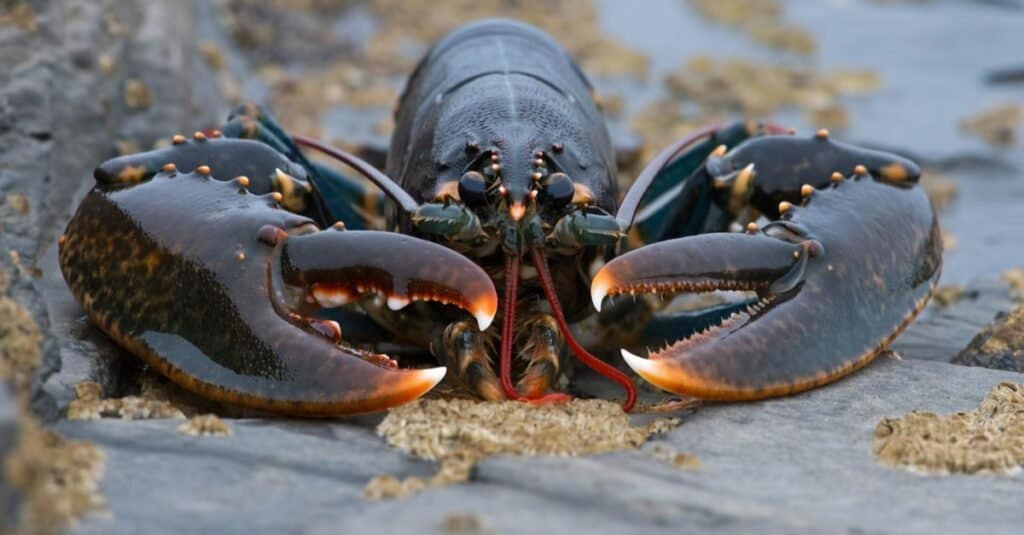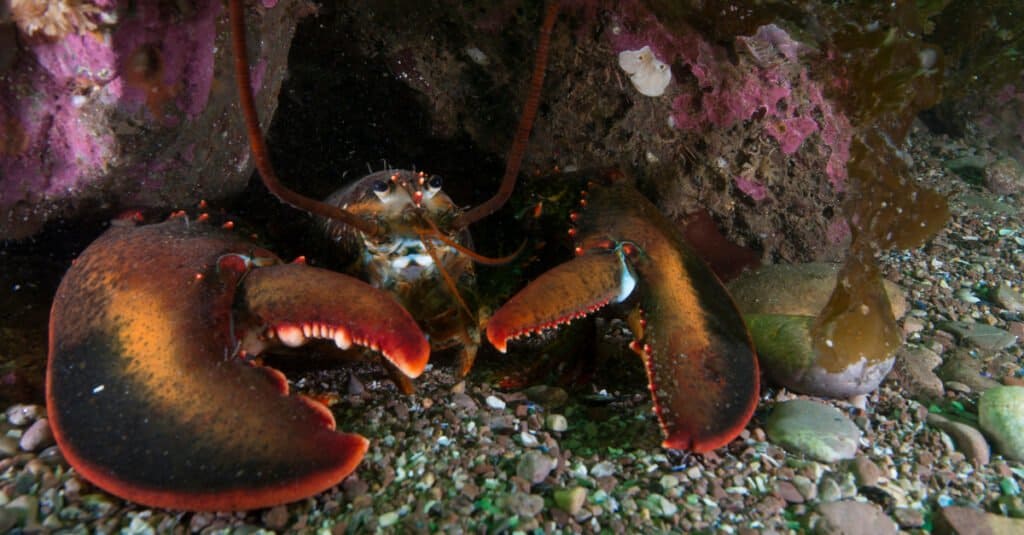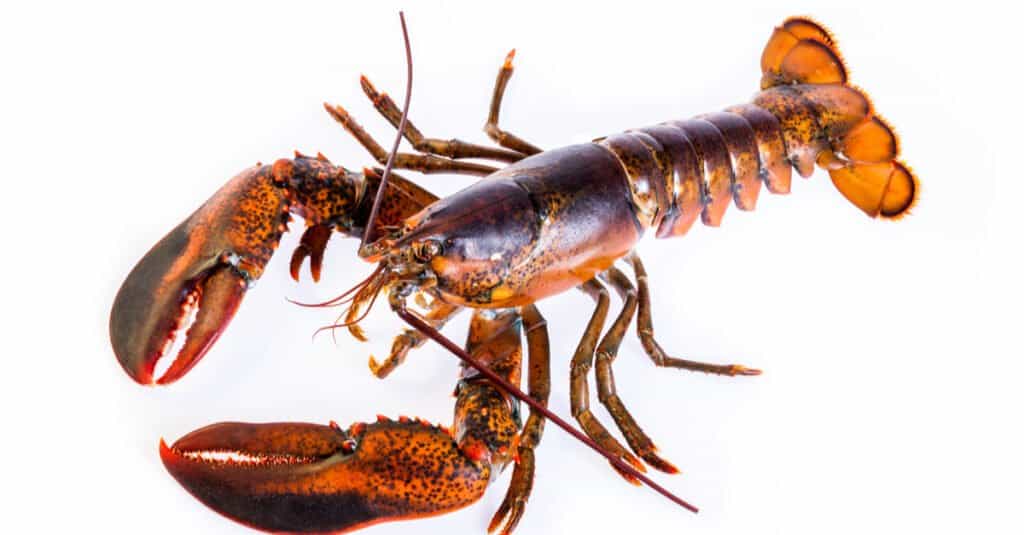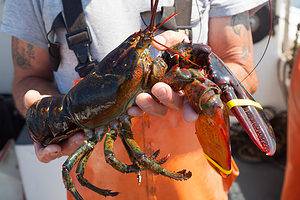Lobsters have existed for around 480 million years. They are a part of the large marine crustaceans family, also known as Nephropidae. Lobsters are lovers and occupants of all oceans, fond of rocky, sandy, muddy bottoms.
They live on their own, all while dining on fish, mollusks, other crustaceans, worms, and even some plant life; the lobster continues its journey on the planet we call Earth. But how long does its journey last? Let’s dive into the oldest record lobster and discover why these incredible animals can even outlive humans!
The Cockroach Of The Sea

The oldest lobster was believed to live 140 years, older than any human!
©davemhuntphotography/Shutterstock.com
Not always seen as the delicacy we praise them as today, lobsters were originally a poor man’s food. The 1600s saw an abundance of them washing up on shore, making it easy for people to acquire the sea dwellers. With their abundance keeping the price exceptionally low and being a comprehensive source of nutrition, it was an easy meal choice for the poor.
So common, in fact, that they were even used as bait when fishing and used as farm food or even fertilizer. Nowadays, lobster is considered a delicacy, and the average market price is currently going from anywhere between $8-15 dollars a pound.
Are Lobsters Immortal?
There is the notion that lobsters are immortal, which I do not blame people for wanting to believe; it sounds really cool. However, unlike the immortal jellyfish, lobsters, while they have impressive longevity, are not immortal. At least not in the traditional sense.
Their long lifespan could potentially be due to the enzyme telomerase, which is expressed by most vertebrates during embryonic stages yet is, for the most part, absent from adult stages of life. Yet, unlike vertebrates, lobsters exhibit telomerase as adults through most of their tissue, which has been suggested to be related to their long lives and the reason behind the thought of their supposed immortality. Put more simply, thanks to the release of telomerase throughout their life, lobsters never stop growing while most animals cease growth after they reach sexual maturity.
So then, why do lobsters perish?
This can be answered by looking into how lobsters grow, which is a process known as molting. Molting demands a lot of energy, and the larger the shell, the more energy is required. Over time, the lobster will perish due to exhaustion during one of its molts. Older ones will stop molting altogether, which leads to the shell becoming damaged or infected, ultimately causing their demise.
The Lifespan Of A Lobster

Lobsters typically have a lifespan of about 45-50 years.
©RLS Photo/Shutterstock.com
Lobsters are apparently exceedingly difficult to age. Nobody knows exactly how old they can get, with some experts even estimating that they could live on the ocean floor for as long as a century or more. This is judged by going off size with some variables and has been the method used for some time. However, some new techniques have emerged over the years, giving better insight into a crustacean’s age.
There is even a research team using a method that relies on quantifying DNA changes that accumulate with age within a lobster. But, with an estimated average lifespan of 45-50 years, the question remains, what is the oldest one ever found?
Well, there have been a few over the years who have shot well past the average with quite impressive numbers. Larry the lobster, caught in Florida in 2016, weighed in at 15 pounds with an estimated age of 110 years old. Then we have Louie, captured in 1997 and located in Hempstead, New York. Louie weighed in at 22 pounds with an estimated age of 132 years old. All of these are very impressive, but one stands above the rest, and their name is George.
The World’s Oldest Lobster

Lobster grow larger with age so the largest lobsters are generally the oldest.
©LittlePerfectStock/Shutterstock.com
The oldest lobster in the world was named George and its estimated he was an incredible 140 years old, making him older than any human (the oldest human on record was 122 years old).
George is an Atlantic lobster and was caught off the coast of Newfoundland, Canada, in 2008. He weighed in at 20 pounds with an estimated birth year of 1869, which would approximate his age to be an amazing 140 years old. Fortunately for George, his journey did not end on that boat in Newfoundland or on someone’s plate; instead, he ended up being sold to a seafood restaurant in Park Avenue South for one hundred dollars.
The restaurant manager never intended to sell him to be eaten but to draw attention to the establishment, which worked, and he became a sort of mascot for the establishment. This is also where he would be given his name, with a young restaurant patron dubbing him George.
His time as a mascot was short-lived, however. Word reached PETA about him being kept in the restaurant, and they began to speak out for his release, which is exactly what happened.
They first took him to Portsmouth, New Hampshire, where experts would help his acclimation back into the wild. Later, he was later driven to Maine and released back into the waters north of Kennebunkport by PETA members, where he always belonged, on January 10, 2009. Lobster fishing was forbidden in that area, thus the reason they chose the location.
The Conservation Status of Lobsters Today
Lobsters are heavily fished worldwide for their meat, with most of the global catch being in temperate waters. It is difficult to catch them in copious quantities. However, their size can make up for this and provide a profitable catch. With there being 250 million American lobsters in the Gulf of Maine, it seems as though it does not intend to end its 480 million run anytime soon.
With so many yet undiscovered, this gives rise to the possibility that we may come across a lobster even older than George; only time will tell. However, even with fishers capturing tons of lobsters every year, their numbers remain stable.
Also, if a fisherman captures a female with eggs, it is illegal to hold her, and she must be returned to the sea. This is just some of the many actions that strive to ensure a steady increase in the lobster population.
The photo featured at the top of this post is © LittlePerfectStock/Shutterstock.com
Thank you for reading! Have some feedback for us? Contact the AZ Animals editorial team.






